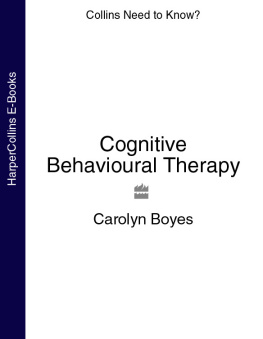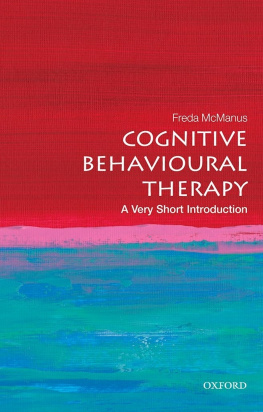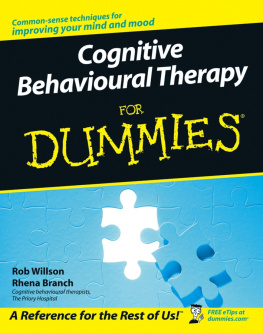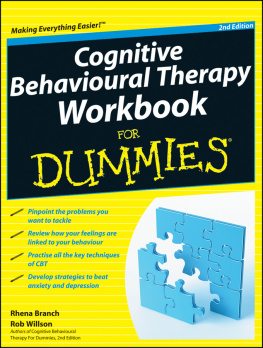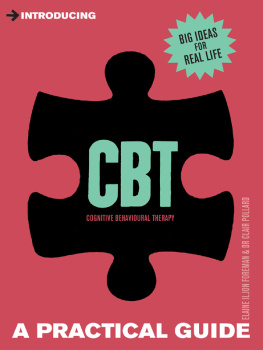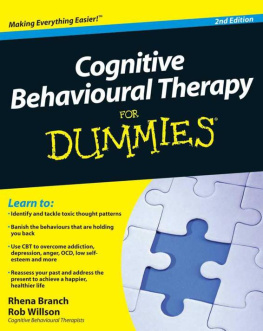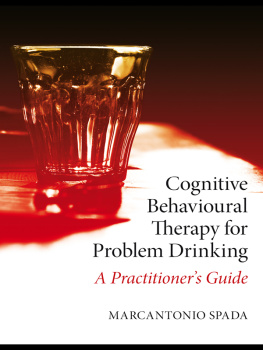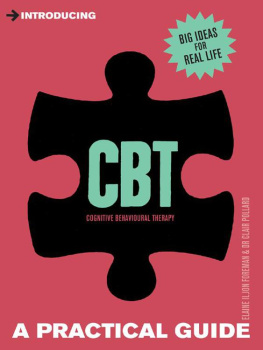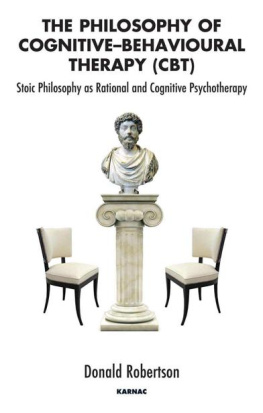Çili Soljana - Autobiographical memory and the self : relationship and implications for cognitive-behavioural therapy
Here you can read online Çili Soljana - Autobiographical memory and the self : relationship and implications for cognitive-behavioural therapy full text of the book (entire story) in english for free. Download pdf and epub, get meaning, cover and reviews about this ebook. year: 2019, publisher: Routledge, genre: Religion. Description of the work, (preface) as well as reviews are available. Best literature library LitArk.com created for fans of good reading and offers a wide selection of genres:
Romance novel
Science fiction
Adventure
Detective
Science
History
Home and family
Prose
Art
Politics
Computer
Non-fiction
Religion
Business
Children
Humor
Choose a favorite category and find really read worthwhile books. Enjoy immersion in the world of imagination, feel the emotions of the characters or learn something new for yourself, make an fascinating discovery.

- Book:Autobiographical memory and the self : relationship and implications for cognitive-behavioural therapy
- Author:
- Publisher:Routledge
- Genre:
- Year:2019
- Rating:3 / 5
- Favourites:Add to favourites
- Your mark:
- 60
- 1
- 2
- 3
- 4
- 5
Autobiographical memory and the self : relationship and implications for cognitive-behavioural therapy: summary, description and annotation
We offer to read an annotation, description, summary or preface (depends on what the author of the book "Autobiographical memory and the self : relationship and implications for cognitive-behavioural therapy" wrote himself). If you haven't found the necessary information about the book — write in the comments, we will try to find it.
Çili Soljana: author's other books
Who wrote Autobiographical memory and the self : relationship and implications for cognitive-behavioural therapy? Find out the surname, the name of the author of the book and a list of all author's works by series.
Autobiographical memory and the self : relationship and implications for cognitive-behavioural therapy — read online for free the complete book (whole text) full work
Below is the text of the book, divided by pages. System saving the place of the last page read, allows you to conveniently read the book "Autobiographical memory and the self : relationship and implications for cognitive-behavioural therapy" online for free, without having to search again every time where you left off. Put a bookmark, and you can go to the page where you finished reading at any time.
Font size:
Interval:
Bookmark:

Autobiographical Memory and the Self is that rare work in psychology that provides a synthesis across subfields that is both theoretically original and of immediate practical value to the clinician. By demonstrating the powerful role of memory in ongoing thought, emotion, and motivation, the authors illustrate the centrality of remembered experience in goal definition and goal pursuit. Taking this a step further, they provide research on the linkage of autobiographical memory recall to both well-being and psychological disorder. Finally, they provide concrete evidence for how attention to memory processes can be a critical factor in the healing work of practitioners. This book is essential reading for both researchers and therapists.
Jefferson A. Singer, Ph.D., Dean of the College, Faulk Foundation Professor of Psychology, Connecticut College, USA
Autobiographical Memory and the Self
Autobiographical memory shapes our understanding of ourselves, guides our behaviour, and helps us to develop and maintain relationships with others. The ways in which we interpret and narrate our memories have important implications for our psychological well-being, and can sometimes contribute to the onset and maintenance of a variety of psychological disorders.
Autobiographical Memory and the Self: Relationship and Implications for Cognitive-Behavioural Therapy synthesises the growing cognitive, social, personality, and clinical psychological literature on the memory-self relationship. It creates an interdisciplinary dialogue which explores autobiographical memory and its relevance for clinical practice, especially cognitive-behavioural therapy (CBT).
The authors propose a model for understanding the mechanisms of change involved in therapeutic interventions targeting negative or traumatic memories whilst providing insights into recent debates and avenues for future research. Autobiographical Memory and the Self will be useful to clinicians and clinical trainees, researchers, and psychology postgraduate students.
Soljana ili is Lecturer in Psychology at the University of the Arts London and a visiting academic at the University of Southampton, UK. Her research focuses on the memory-imagery-self relationship.
Lusia Stopa is Professor of Clinical Psychology at the University of Southampton, UK. Her research examines how imagery represents the self and how imagery interventions can change negative self-views.
Autobiographical Memory and the Self
Relationship and Implications for Cognitive-Behavioural Therapy
Soljana ili and Lusia Stopa

First published 2019
by Routledge
2 Park Square, Milton Park, Abingdon, Oxon OX14 4RN
and by Routledge
711 Third Avenue, New York, NY 10017
Routledge is an imprint of the Taylor & Francis Group, an informa business
2019 Soljana ili and Lusia Stopa
The right of Soljana ili and Lusia Stopa to be identified as authors of this work has been asserted by them in accordance with sections 77 and 78 of the Copyright, Designs and Patents Act 1988.
All rights reserved. No part of this book may be reprinted or reproduced or utilized in any form or by any electronic, mechanical, or other means, now known or hereafter invented, including photocopying and recording, or in any information storage or retrieval system, without permission in writing from the publishers.
Trademark notice: Product or corporate names may be trademarks or registered trademarks, and are used only for identification and explanation without intent to infringe.
British Library Cataloguing-in-Publication Data
A catalogue record for this book is available from the British Library
Library of Congress Cataloging-in-Publication Data
Names: ili, Soljana, author. | Stopa, Lusia Aldona, 1954 author.
Title: Autobiographical memory and the self : relationship and implications for cognitive-behavioural therapy / Soljana ili and Lusia Stopa.
Description: Abingdon, Oxon ; New York, NY : Routledge, 2019. | Includes index.
Identifiers: LCCN 2018018233 (print) | LCCN 2018021094 (ebook) | ISBN 9781351606103 (Adobe) | ISBN 9781351606080 (Mobipocket) | ISBN 9781351606097 (ePub) | ISBN 9781138093010 (hardback) | ISBN 9781315107103 (ebook)
Subjects: LCSH: Autobiographical memory. | Self. | Cognitive therapy.
Classification: LCC BF378.A87 (ebook) | LCC BF378.A87 C495 2019 (print) | DDC 153.1/3dc23
LC record available at https://lccn.loc.gov/2018018233
ISBN: 978-1-138-09301-0 (hbk)
ISBN: 978-1-315-10710-3 (ebk)
Typeset in Times New Roman
by Out of House Publishing
To my parents, Suzana and Ferdinant ili, and my sisters, Egla and Nikolina
S
To my husband,BruceHunt and my children Chloe and James Stopa-Hunt for all their support
LS
Contents
We would like to thank the staff at Routledge, especially Ceri McLardy (our Editor) and Sophie Crowe (Editorial Assistant), for their support. I, Soljana, am grateful to Professors Dan P. McAdams and Jonathan M. Adler for answering my questions at various stages of the writing and to Professor Jefferson A. Singer for providing valuable suggestions for .
In April 2016, media outlets such as The Independent and Vanity Fair reported a statement made days earlier by Sir Ian McKellen at the Oxford Literary Festival, United Kingdom. Talking about the memoirs he had initially agreed to write for a British publishing house, he reportedly stated:
I put nine months aside to do it, and I got a very handsome advance. Then I sent the money back It was a bit painful. I didnt want to go back into my life and imagine things that I hadnt understood so far.
(Oppenheim, 2016)
While for some people this may have been simply a curious piece of news (the advance Sir Ian had returned was, after all, rumoured to be around 1 million), for anyone who has a painful past or just happens to be a memory researcher, Sir Ians decision made sense. Fortunately or unfortunately, the past does not stay in the past. It shapes our personality, colours our views of ourselves and the world around us, and affects our emotions and how we behave or interact with our environment. As such, our past accompanies us in the present and shapes our future for better or worse. When it involves negative experiences, thinking about it can be painful and may be best avoided even when you are offered 1 million to do it!
Memory has attracted scholars attention for centuries. In fact, some modern conceptualisations of memory have much in common with arguments made by Socrates and Aristotle (see Bloch, 2007; Ricoeur, 2004). The interest in memory especially autobiographical memory (AM) grew significantly in 17th-century Europe, where social and economic changes led to a weakening of the extended family structure and to the rise of an individualistic culture that viewed individuals as autonomous and distinct from their social context (see Nelson, 2003). This was reflected at the time in the growing interest in individuals unique life stories, for example those presented in novels and biographies. It continued to develop further into the 19th century, when there was an increased sense of conflict between the individual and society that resulted from social, economic, and political unrest and that led to a growing focus on the need for individuals to define their own selves and purposes in life (see Baumeister, 1987). Further social transformations occurring in the 20th and 21st centuries intensified the interest in memory. The last decades, in particular, have witnessed a worldwide rise in individualism, potentially as a result of factors (e.g., socioeconomic development and reduced infectious disease prevalence) that have contributed to a reduction in individuals need to rely on their social groups (see Santos, Varnum, & Grossmann, 2017). In some countries this has been accompanied by a shift towards
Font size:
Interval:
Bookmark:
Similar books «Autobiographical memory and the self : relationship and implications for cognitive-behavioural therapy»
Look at similar books to Autobiographical memory and the self : relationship and implications for cognitive-behavioural therapy. We have selected literature similar in name and meaning in the hope of providing readers with more options to find new, interesting, not yet read works.
Discussion, reviews of the book Autobiographical memory and the self : relationship and implications for cognitive-behavioural therapy and just readers' own opinions. Leave your comments, write what you think about the work, its meaning or the main characters. Specify what exactly you liked and what you didn't like, and why you think so.

